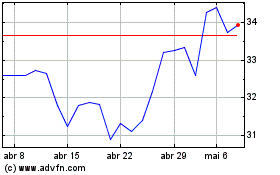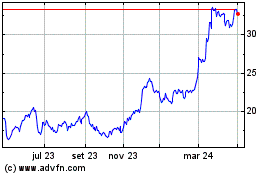Global Trade Spat Unnerves Plane Makers
15 Julho 2018 - 5:58PM
Dow Jones News
By Andrew Tangel and Robert Wall
LONDON -- Aerospace executives at plane makers Boeing Co. and
Airbus SE, along with their suppliers, said they are worried new
trade barriers could drive up plane manufacturing costs and lead
airlines to put off purchases.
"Aerospace thrives on global trade -- free and open trade,"
Boeing Chief Executive Dennis Muilenburg said in London on Sunday
ahead of the Farnborough International Airshow, the industry's
flagship gathering that kicks off Monday.
"We're concerned about some of the ongoing talk about tariffs
and trade restrictions," the head of the U.S.'s largest exporter
told reporters, though he added that there had been no material
effect on company so far.
Earlier this month, Tom Enders, chief executive of European
rival Airbus, said protectionist sentiments could dampen global
growth. "There are some clouds on the horizon," he said. "We're on
the brink of a trade war" between the U.S. and China as well as
with Europe, he said.
Worries over shifting trade policies, new tariffs and other
barriers come as plane makers including Boeing, Airbus and Embraer
are looking to tout their latest deals to drum up buzz and new
business.
The Trump administration this year imposed tariffs on a range of
imports from aluminum to washing machines from China, the European
Union and others, saying previous trade deals treated the U.S.
unfairly and threatened domestic jobs.
Airlines are currently in buying mode amid rising world-wide
passenger demand, and airplanes have so far largely avoided being
targeted by tariffs from the U.S. and China The U.S., though, has
taken aim at some airplane parts imported from China. China had
threatened to target finished jetliners, but so far hasn't.
The U.S. clash with China is particularly fraught for Boeing
because it has big business in both countries. Boeing is
forecasting industrywide demand growth over the next two decades:
43,000 commercial planes worth nearly $7 trillion, up from 41,000
forecast for the next two decades last year. Of that, 7,200 planes
should go to China.
In a May 11 letter to the U.S. Trade Representative's office,
Boeing executive Timothy Keating said such tariffs could threaten
Boeing's access to China, which could retaliate by slowing or
refusing imports of Boeing commercial jetliners, opening the door
for rival Airbus.
Mr. Muilenburg on Sunday expressed hope that both U.S. and
Chinese leaders would recognize what he described as the two
countries' symbiotic relationship, crucial to growth and job
creation.
China is expected to become a driver of global demand for
commercial planes in coming years, he said, adding: "They need the
lift, the aerospace capability to help drive the rest of their
economic growth agenda."
Gaël Méheust, chief executive of engine maker CFM International,
a joint venture of General Electric Co. and France's Safran SA,
said, "We're really hoping that this is just politics and this will
not affect, in the long-run, the economy."
Trade is only one of the potential threats to an almost
decadelong period in airline passenger growth, Mr. Méheust said. A
drop in cargo demand, often a leading indicator for air traffic,
rising oil prices and labor cost inflation are "an indication
things may not be as good as we want."
Brazilian airliner maker Embraer SA said it is worried about the
currency effect for the dollar-denominated industry amid the trade
conflict. Chief Executive Paulo César de Souza e Silva said in an
interview that "a much stronger dollar vis-à-vis local currencies
can cause more challenges for the airlines."
Write to Andrew Tangel at Andrew.Tangel@wsj.com and Robert Wall
at robert.wall@wsj.com
(END) Dow Jones Newswires
July 15, 2018 16:43 ET (20:43 GMT)
Copyright (c) 2018 Dow Jones & Company, Inc.
EMBRAER ON (BOV:EMBR3)
Gráfico Histórico do Ativo
De Mar 2024 até Abr 2024

EMBRAER ON (BOV:EMBR3)
Gráfico Histórico do Ativo
De Abr 2023 até Abr 2024
